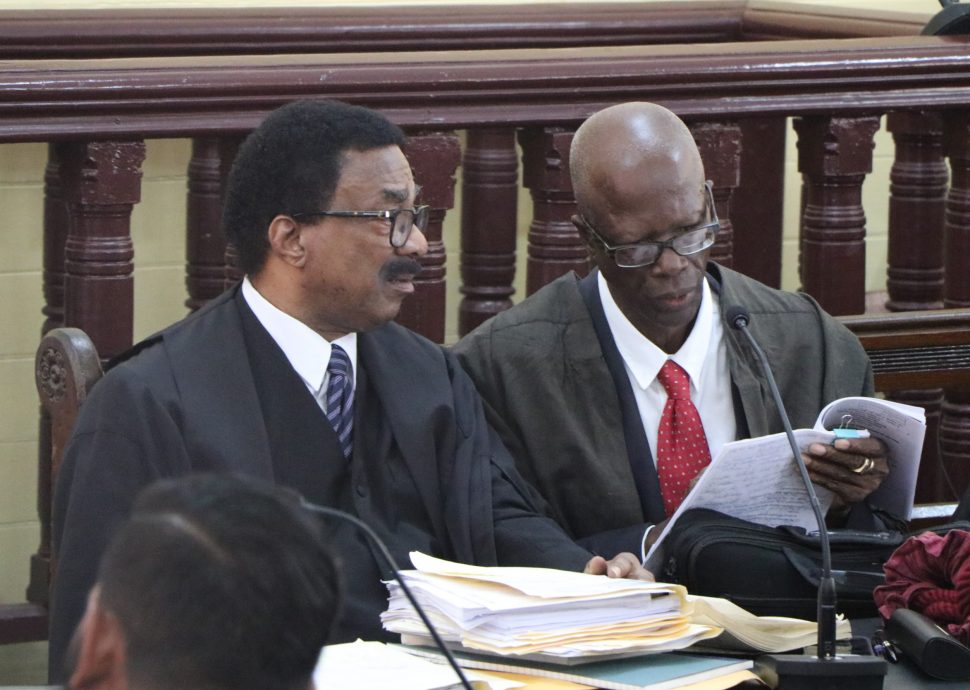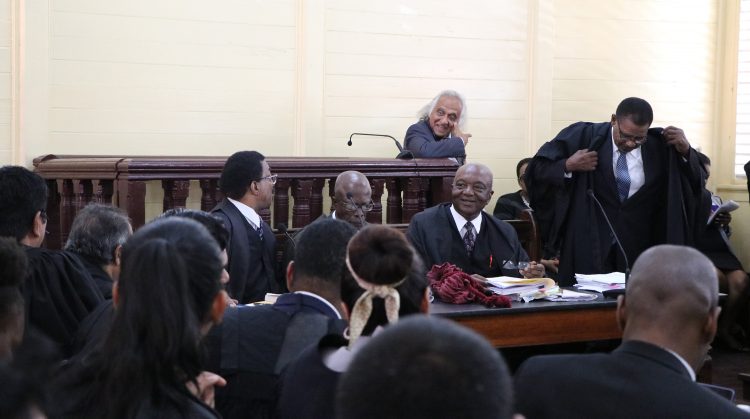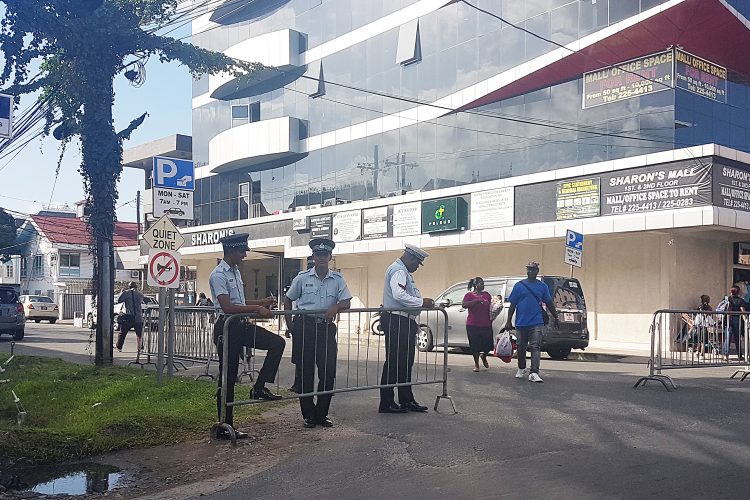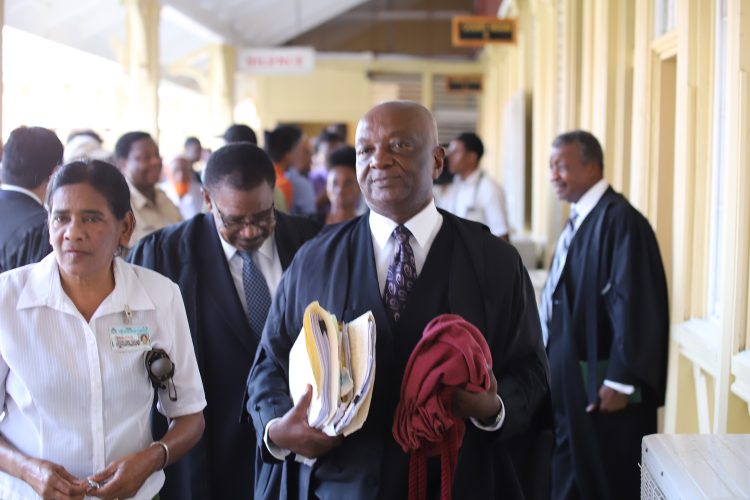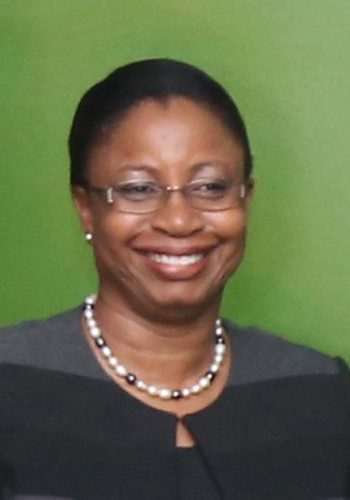Acknowledging the public interest, Chief Justice (ag) Roxane George-Wiltshire SC yesterday said she expected to hand down rulings by month end in the three challenges filed on the December 21st no-confidence motion against government.
“We are going to push ahead and get these matters heard as soon as possible. I am cognisant that the nation is awaiting the outcome of these matters… My anticipation is that by the end of January, we will be through,” Justice George-Wiltshire, who presided over three consecutive hearings at the High Court, said.
The judge also made it clear that she was willing to “stand down” other matters if the need arises, so as to ensure the expeditious determination of the no-confidence cases.
Many turned up to witness the hearings but were not allowed to enter the courtroom given the limited seating.
Towards the end of the hour-long proceedings during which she set timelines for the proceedings in all three cases, Justice George-Wiltshire also announced that the application made by the Attorney General Basil Williams SC to stay the enforcement of the motion would not be entertained. “I didn’t think I would have granted it in any event because of the tight timelines to be fixed,” she said. The motion of no-confidence requires general elections within 90 days from December 21.
The contingents of lawyers for the various applicants were so large that some attorneys sat on one of two benches designated for members of the jury, while some stood in the corner of the courtroom.
On December 21st, a vote by then APNU+AFC member Charrandass Persaud to an opposition PPP/C sponsored no-confidence motion against the government tipped the scales 33 to 32 in favour of the motion. Consequently, Speaker of the National Assembly Dr Barton Scotland ruled that the motion had been carried.
Scotland has since refused an invitation by the government to reverse his decision on the motion, saying it could seek redress in court. Three separate legal challenges were subsequently filed. Scotland was present in court yesterday and his attorney, Rafiq Khan SC, informed that his client’s position is that he will “abide and respect any orders the court makes in these proceedings.”
‘Not the phantom’
At 1.30 pm yesterday, the first matter, which was filed by private citizen Compton Reid, was called.
In the action, Reid is seeking a declaration that Persaud could not have been qualified for election as a member of the National Assembly in the first place since he has pledged allegiance to Canada. Reid is also asking for an order setting aside the order of the Speaker that the no-confidence motion was passed. He also asked for an order staying the enforcement of the motion. Additionally, he has asked the court for a conservatory order, preserving the status quo ante that the government remains in office until the hearing and determination of his application.
Reid lists Scotland, Persaud and the AG as respondents.
Reid’s attorney Neil Boston SC informed the court of the New Amsterdam resident’s presence in the room. “He is not the phantom Richardson,” the attorney said, in direct reference to Cedric Richardson, who was the unseen applicant in a challenge to the validity of the presidential term limit.
From the outset, Justice George-Wiltshire made it clear that she was dealing with case management.
During the hearing, Justice George-Wiltshire indicated that she would strike out an affidavit filed on behalf of Persaud but would permit an oral application. Persaud has filed an action asking for Reid’s application to be struck out. Reid’s attorneys have since asked the court to strike out Persaud’s application.
On the issue of the conservatory order, Boston said that he did not wish to proceed at the moment with the application. He was told that it was “a wise move” and he later said no useful purpose will be served in pursuing the order if a ruling is going to be made shortly.
Boston subsequently told reporters that he was comfortable with the CJ’s decision that she would not deal with the stay of execution or the conservatory order given that she will soon rule on the entire case. “The conservatory order at this time is not important because the final issue will be determined by the end of the month. So what are we conserving? Three months hasn’t expired. Even at the date of ruling, the three months would not have expired pursuant to [Article] 106 [of the Constitution],” he said.
In addition to setting the timelines for submissions, the judge also heard applications by Opposition Leader Bharrat Jagdeo, APNU Chairman Joseph Harmon and attorney and leader of the National Independent Party Saphier Husain to join the proceedings as interested parties.
Jagdeo’s attorney Anil Nandlall, who had the largest legal team, submitted that the PPP was likely to be affected by orders which may be made in the proceedings and that as a result his client wanted to be added to the proceedings.
With respect to Harmon, his attorney, Roysdale Forde, told the court APNU constitutes part of the government and posited that any order made may have an impact on that party.
She granted the applications for Jagdeo and Harmon after no objections were raised by the applicant and the respondents. Boston made it clear that he had no objections. “The door is open for all prospective applicants to enter,” he said.
Justice George-Wiltshire, however, denied Husain’s application, while expressing the view that it did not met the “threshold” for him to be added as a party in the matter. She had to adjourn the court for about 15 minutes after she was made aware that Husain was accidentally given a later time.
When court resumed, Husain was asked what made him so unique to make him eligible to join the proceedings. In response, he cited, among other things, that his party has been around since 1997, that he has dealt with many constitutional matters, that he has contested in elections before and that he intends to contest the upcoming polls.
Minutes after the judge rejected his decision, he picked up his belongings and left the courtroom.
It was eventually agreed that the exchange of submissions has to be done on or before January 18th; rebuttal submissions are to be served and filed on or by January 21st; and all parties will return to court on January 24th at 9.30 am to make oral submissions. Justice George-Wiltshire requested that all submissions be emailed to make the compilation of her decisions easier.
To preserve the status quo
The second application, which was filed by Williams, is asking the court to settle the legality of the vote on the motion, which he contends needed the support of an “absolute majority” of 34 of the 65 elected Members of Parliament to be valid.
In this matter, Justice George-Wiltshire granted an application for Harmon to be added as an interested party.
In his action, which was filed on January 7th, Williams has applied for orders to stay the enforcement of the motion and enable President David Granger and all his ministers to remain in office. He contends that the ruling by Scotland that it was carried by a vote of 33 to 32 was unlawful.
In dealing with those applications, Williams told the court yesterday that he is seeking to preserve the status quo. When asked to explain what he means, he said that the government and president should remain in office until the hearing and determination of the matter.
In the application that he filed, Williams states that the conservatory order is necessary to preserve the status quo ante since even though Article 106 (7) requires that the President and all Ministers of the Government remain in office and hold elections within three months, the period for the hearing and determination of the matter may expire before that time.
He advances that the granting of the conservatory order by the court will preserve the status quo ante, especially in the relation to the three-month period by which elections are due and resignation of the government.
For this case, the exchange of submissions also has to be done on or before January 18th, with rebuttal submissions to be served and filed on or by January 21st and all parties will return to court on January 25th at 1.30 pm to make oral submissions.
The third matter, which was filed on behalf of attorney Christopher Ram, will be heard on January 23rd at 2 pm. The dates set in the other two cases for the exchange of submissions and rebuttals are the same for Ram’s case.
On January 8th, Ram, through attorney Kamal Ramkarran, asked the High Court to uphold the recent passage of the no-confidence motion and to declare that the President and his Cabinet should immediately resign as a result.
In an urgent fixed date application, Ram is seeking, among other things, declarations from the court that the motion was lawfully passed and that the President and his Cabinet should immediately resign in keeping with Article 106(6) of the Constitution.
Ram’s application contends that the government was defeated and that elections must be called within 90 days from the passage of the motion.
‘Other issues’
Meanwhile, during the hearing of Reid’s application, the AG requested an extension to file an affidavit in defence which will include “some other issues.” Asked what these were, he explained that they were not addressed in Reid’s claim and “when we do our defence to that we will now have to introduce these claims.” Williams, after acknowledging that the issues are matters of law, was told that he did not need an Affidavit in Defence and he could include them in his submission. He persisted, requesting leave to add “it as a question.” He later disclosed that this question has to do with Article 70 of the constitution.
Following his persistence on the matter, he was told to file the Affidavit by today.
Williams later explained that his team’s position is that this is an entrenched provision that provides for a five-year term and that a two-thirds majority is required to amend it. “And only the president, who is a part of the government, can truncate that term by dissolving or proroguing but there is no provision by the framers [of the constitution],” he said.
Article 70 provides for the prorogation and dissolution of Parliament. It says at 70(3) that “Parliament, unless sooner dissolved, shall continue for five years from the date when the Assembly first meets after any dissolution and shall then stand dissolved.”
Both Williams and Nandlall expressed satisfaction with the timelines set.
Nandlall told reporters moments after the cases were adjourned that depending on the ruling, he is prepared to proceed to the Court of Appeal and the Caribbean Court of Justice (CCJ) if necessary. He said that he will have to discuss this with his client but “if I believe… the constitution is not being complied with, then certainly no unconstitutionality must be left unchallenged for the public record and for precedence in the future. These things here are important, are fundamental to our evolving democracy. We have to address them now so that future generations of ours will be guided and will not have to go through the trials and tribulations [in] which we are now engaged.”
